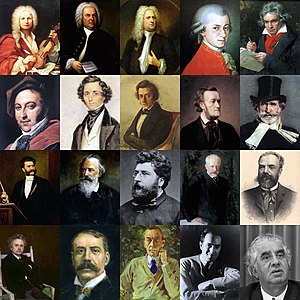 |
| Does Classical Music Make You Dance? |
In this article (and subsequent writer's retort) Les Dreyer contends that classical music is dying to the likes of the "cacophony of rock and the neon glitter of “American Idol”.
CLASSIC(AL) ROCK CONTROVERSY
While Les Dreyer does have many valid points that any classical music lover (or composer/performer like myself) can appreciate, there is a clear generational/demographic bias that scoffs at one reader's request that classical music concerts allow the audience members "rock-n-roll".
Dreyer retorts, "What on earth does emoting with our bodies and voices have to do with classical music? Would you let out a yell of joy during a Mozart opera, or a moan of despair during “Parsifal”?
 |
| Classical Music In The Park (Photo credit: Photo Gallery) |
To deny that classical music has little to do with "emoting with our bodies" ignores every great ballet or dance composition ever created in the great western tradition.
Do we really believe that ballet dancers politely stood quietly without moving their bodies in The Nutrcracker or Swan Lake? Were great Viennese waltzes simply listened to passively at great royal balls? And what of the entire library of Renaissance music, improvised and created by little more than traveling buskers looking for a good party? Perhaps only sacred classical music can fit the narrow definition presented by Les Dreyer of classical music that requires nothing but quiet thought/contemplation and little else.
I applaud Dreyer for daring to hit such a controversial subject. As I mentioned in my unpublished response to his New York Times article, classical music is not dying. It has evolved. That audiences today see little merit in watching a concert that requires pure silence for three hours in an atmosphere prohibitive to anyone under the age of 18 (or the parent that must drag a minor to these types of events) is not surprising. Another false premise was made here, that most people will pay high prices for pop or rock tickets, which anyone in the now failing dinosaur of the commercial music industry will tell you is not the case.
THE FAILURE OF GIANTS
 |
| We forget that Classical Composers were once Contemporary Composers |
I contend that we stop the wringing of our hands in both classical and commercial music. In a world where millions can just as easily pirate Lady Gaga or Beethoven, the issue is less of an artistic nature but whether those in charge of the greatest cultural and music institutions of our time are willing to conform and change to a new plugged-in, multicultural, multigenerational, multi-faceted online universe where the limits of musical creativity are unlimited.
We forget that Classical Composers were once Contemporary Composers.
I propose solutions which try to rectify the neglect of generations of children (now adults), neglect of lower to middle class income earners, neglect of classical music traditions outside of Europe, and neglect of today's burgeoning generations. Only by embracing technology and embracing our changing selves will classical music continue to survive the tests of time.
-----------
Award-winning contemporary composer Sabrina Pena Young's works have been performed throughout Asia, the Americas, Europe, and Australia. Young has been published in the Kapralova Society Journal, New Music Box, Percussive Notes, the SAI Music Journal, the SEAMUS Music Journal, and other arts websites and publications. Young is currently working on her modern opera, Libertaria: The Virtual Opera, which combines electronic music, machinima animation, and classical music in a riveting sci-fi opera set in post-USA New York in 2129AD.









Comments